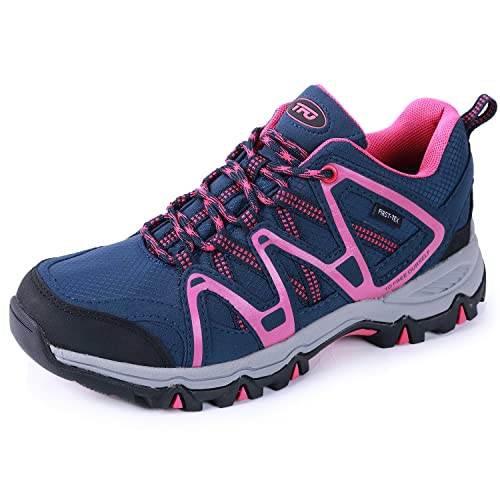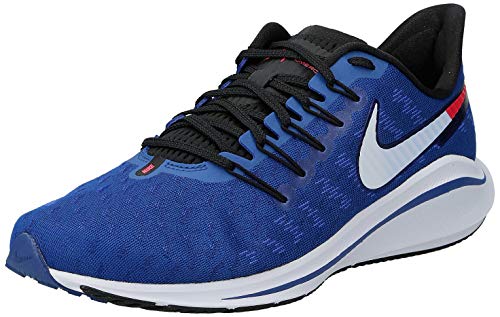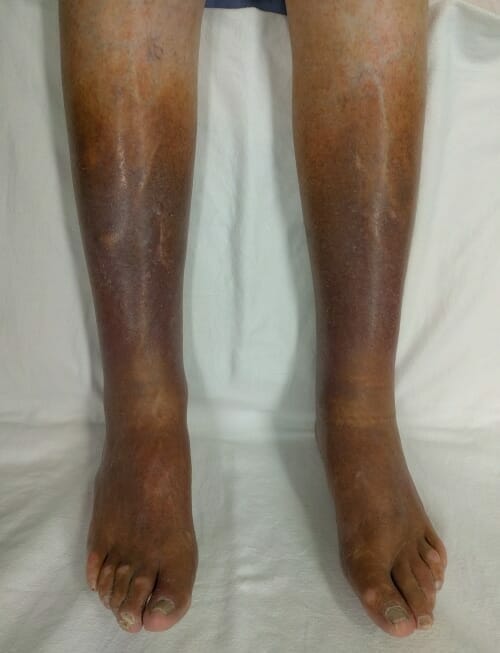Did you know that the quality of the shoes you wear and your lifestyle has a deep impact on the health of your veins? Cardiovascular diseases like chronic venous insufficiency (CVI) can be prevented and helped with the right pair of shoes.
If you are suffering from a like , your doctor may have prescribed lifestyle changes such as eating right and exercising to improve your . Apart from this, you may need to change your shoes and stockings as well.
A person suffering from venous insufficiency should ditch shoes with heels immediately. Flat soles are the best choice for legs with venous problems.Furthermore, look for shoes that have adequate cushioning.
In this article, we look deeper into the types of shoes that are suitable for those with venous insufficiency. We will also suggest the best products available currently based on our research, analysis, and experience. We hope these details will help make the choice easier for you and save you time and effort.
The table below provides a snapshot of our top picks for best shoes for venous insufficiency. Read further for our full recommendations and discussions.
|
Material:
Fabric and Synthetic
|
Material:
First-Tex technology based
|
Material:
Synthetic
|
Material:
Synthetic
|
Material:
Textile and Synthetic
|
|
Insole:
Ortholite
|
Insole:
Air circulation insole
|
Insole:
Foam pods
|
Insole:
NA
|
Insole:
NA
|
|
Outsole:
Ortholite
|
Outsole:
Aircraft tire rubber
|
Outsole:
Foam
|
Outsole:
Rubber sole
|
Outsole:
Synthetic Sole
|
Contents
Best Recommended Shoes For Venous Insufficiency
#1 – Skechers Women’s Go Slip-On Walking Shoes
The Skechers Women’s Go Slip-On Walking Shoes are one of the most comfortable shoes on the market. The shoes are specially designed for walking and standing for a long time throughout the day.

These shoes are a good choice for people who suffer from venous insufficiency. They are pure flats, so they have no heels at all. Secondly, they are made from 100% synthetic and fabric, which makes them very breathable and elastic, fitting nicely and comfortably on your feet.
The shoes have Ortholite insoles, a technology that helps to keep your feet odor-free. They also have independent circular sensors, which lead to a responsive walking experience.
The insole is made from resalyte, a special compound that is meant to provide protection to your feet without compromising on comfort.
Pros
- The resalyte insole of these sneakers makes them comfortable footwear.
- The shoes are extremely lightweight and comfortable
- They are made from synthetic material which makes them flexible and elastic, thereby ensuring a perfect fit on your feet.
- They are flats, which are suitable for those with CVI.
- These pairs of shoes are quite stylish to wear on any formal occasion.
- The Ortholite insole ensures that your feet are odor free even after long usage.
- Available in a large variety of colors.
Cons
- The shoes are not waterproof and should avoid rain and snow.
You may also like Best Running Shoes For Seniors
#2 – TFO Women’s Lightweight Shoes
The TFO women’s lightweight shoes are perfect for people who are suffering from venous insufficiency. There are three aspects to this shoe that make it a perfect choice for such patients: its fabric, air circulation insole, and ankle support.

The fabric of the shoe is made up of First Tex-technology, which allows air to pass through it via microscopic holes, making the shoe breathable while at the same time waterproof.
The insoles are also designed to be breathable, reduce stuffiness in the foot, relieve fatigue, and reduce odor. The insole also protects your ankle from joint-related pain.
The shoes are very comfortable and lightweight. It has anti-collision toe cups which protect your toes from getting hurt when you bump into an obstacle.
The EVA midsole and arch support on this shoe helps to protect your ankles and knees from the impact of walking or running too fast.
Pros
- The shoes are quite stylish and can be worn with dresses or pants.
- The fabric is breathable due to the presence of microscopic holes, while also being waterproof.
- Insole is designed to reduce fatigue on your foot and also protect your ankle.
- The shoe also protects your knees and ankle joint from impact while walking or running.
- The shoes are lightweight, durable and comfortable.
Cons
- These shoes can be tight, so it may be advisable to buy one size up.
#3 – Nike Air Zoom Vomero 14
Nike’s new Vomero 14 is a shoe that combines comfort with numerous health benefits. These shoes are an ideal footwear choice for people with venous problems.

These Nike running shoes come with a variety of features that make them ideal for varicose veins and venous insufficiency. The shoes feature a notched tongue, which helps to provide a stable fit.
The foam pads are designed in a way to give a secure feel to your feet. Moreover, its sleek design is tailored to support your stride.
The shoes give a good grip to the feet. They come with soft cushioning, which helps in strengthening the muscles of your calf. The midsole also provides proper cushioning and stability for your feet’s comfort.
Pros
- The sole of these shoes makes them quite comfortable to wear for long hours.
- The shoes are lightweight so that people can easily wear them for the whole day.
- The smooth grip makes it a safe running shoe.
- Foam pads inside the shoe makes it fit very snugly on your feet.
Cons
- The ventilation in the upper of the shoe may cause your feet to feel cold if running in colder weather.
You may also like Best Shoes For Aging Feet
#4 – Mizuno Men’s Wave Rider Running Shoes:
These Mizuno Wave Rider running shoes come with some exciting features that make them versatile and comfortable.

Their rubber sole is designed for comfort. Its uniquely designed cloud wave cushioning technology makes it super comfortable. The midsole is specially designed with a soft heel center.
The shoe ensures a smooth and responsive stride because of its cushioning technology which helps to reduce pressure on your muscles and joints.
The shoe fabric is covered outside with a stretch mesh, which is equipped with an adaptive fit in motion, thereby making the shoes very comfortable when moving. The shoe also has an articulated heel zone.
Pros
- Running becomes easy and comfortable with stretch mesh.
- The midsole of the shoe is designed with a soft heel center, giving it a very comfortable feeling.
- The cloud wave cushioning technology improves the cushion on the foot when walking.
- The shoe is made of a very soft material.
Cons
- The cushioning in the heels does not suit some buyers.
#5 – Adidas Men’s Energy Boost Shoes
Adidas Men’s Energy Boost shoes are ideal for patients with many kinds of feet problems.

Its sole is suitably designed for those suffering from venous insufficiency. The synthetic sole gives a comforting feel to your feet.
These shoes are named energy shoes because they provide extra rebounding energy to the feet.
The four-way engineered stretch mesh enhances flexibility and gives more breathability. The sock-like fit further makes your foot more comfortable. These shoes are uniquely designed for a better walking experience. Moreover, they aid in reducing pain and discomfort.
The Torison system between the heel and forefoot helps give a stable stride. These versatile sneakers are a great go-to pair of shoes for people with venous issues.
Pros
- The four-way engineered stretch mesh makes the shoe comfortable and well-fitting.
- The comfortable cushioning in these sneakers makes them great for running.
- The shoes are lightweight and are a good choice for those who stand for long hours.
- These shoes fit perfectly and smoothly like a sock.
Cons
- The laces may come untied easily. You may need to double tie the knot of the laces.
You may also like Shoes For The Elderly With Balance Problems
What should you look for when buying the best shoes for venous insufficiency?
People suffering from venous insufficiency should look for shoes that have certain characteristics to better support the condition. Here is a buyers’ guide that will enable you to determine the right pair of shoes for yourself.
Flats
The first and foremost recommendation for venous insufficiency patients is to give up on heels. Heels have been shown to reduce muscle pumping function, which can lead to reduced flow of blood in your leg veins, which is the primary cause of venous insufficiency[1]. Therefore, a good flat or very small heel is recommended for venous insufficiency patients.
Flexibility
Shoes meant for should be made from elastic compressed material which can remain flexible throughout the day, yet provide a bit of compression in the feet to help pump blood from the feet. Rigid and stiff shoes can promote , , and , and do nothing to help relieve CVI.
It is recommended to opt for leather shoes only if they fit well and are not rigid. Stiffer dress shoes with a leather upper tend to be a bit too stiff for the purpose of relieving CVI.
Most synthetic walking and running shoes, such as those made of certain fabrics, mesh, and elastics, generally can be found in a size that fits well enough to provide some sort of compression, which can increase blood pressure in the feet and lower leg, helping to promote pumping of blood from the veins in the feet.
Chronic Venous Insufficiency
Notched Tongue
A V-shaped angular shoe improves stability and can give support from your toes to heels.
Comfort-Fit
Make sure that the fitment of shoes is good. Your shoe should neither be too large, nor too small. In the case of CVI, shoes that are too large provide no compression and only leave more room for feet to swell. You also don’t want your shoes to be too tight that they are uncomfortable to wear.
Comfortable Insoles
Insoles made with memory foam, rubber, or other comfortable material will make your walking experience a lot more comfortable during the day. Opt for an insole with good arch support so there is less opportunity for your arches to swell.
You may also like Best Compression Socks for Varicose Veins
Frequently Asked Questions
Q. What is chronic venous insufficiency?
We have valves in the veins of our legs that help blood to be pumped back upwards towards our heart by preventing the blood from flowing downwards. In (CVI), these malfunction for a host of possible reasons, such as a that damages the , sitting or standing for long periods, and other factors.
When the valves malfunction, this can cause blood to pool in your legs and feet, resulting in noticeable swollen feet and legs, pain, itching, and varicose veins (spider vein) that appear closer to the surface of the skin. If CVI is not treated, the pressure and from the pooled blood can cause capillaries to rupture, resulting in further and ulcers that are difficult to heal.
Q. What routes of are there for ?
Chronic venous insufficiency can be treated in a host of different ways depending on how advanced the condition has become and patient’s age and other characteristics.
For less severe CVI, we want to promote the pumping of blood back to the heart and reduce pooling in the lower extremities. This can be helped along by avoiding sitting or standing in place too long, and moving around and exercising. The movement and contraction of leg muscles can help move blood through the veins. This can be further helped by wearing compression stockings and well-fitting, slightly compressive shoes that can provide some external pressure on the legs and feet.
Doctors can also prescribe medications to combat blood clots, as well as antibiotics for ulcers and infections if the CVI has reached the point of blood vessel ruptures.
Medical procedures can include sclerotherapy, which scars problem veins so that blood can flow through healthy veins, as well as endovenous thermal ablation, which employs radio waves or lasers to close up problem veins. If these techniques are not ideal, a may determine that surgery is the best route, whereby the problem veins are treated invasively.
Q. Why should there be special consideration when buying footwear for venous insufficiency?
When dealing with CVI, footwear should be carefully chosen because wear non-ideal footwear can allow for CVI to progress or worsen.
Footwear that is too loose, rigid, and with poor arch support can provide for more space for the feet to swell within the shoes. In addition, shoes that don’t fit comfortably can cause for further irritation when dealing with the potential pain and itching from CVI.
With CVI, it is best to find footwear that fits as perfectly to the shape of the foot as possible. This means the heels are well-cupped, there is just a bit of space for the forefoot to wiggle around, and the arches are well-supported by the insole. Even better, a shoe with some elasticity in the upper can provide a bit of to help promote the flow of blood upwards from the feet.
Q. Are there other products that should be specially considered for venous insufficiency?
As mentioned previously, a person with CVI can opt to wear compression garments along with their specially chosen footwear. Compression stockings provide compression on the legs, helping to treat swelling while promoting the return of venous blood to the heart.
Men and women also have the option of wearing compressive leggings, such as those that worn inside the pants to retain warmth during colder months. These leggings typically have a good amount of elasticity to provide some compression when worn.
Parting Words – CVI starts at the feet
A like can be helped along with the right pair of shoes, while an unsuitable pair may allow for the worsening of .
In this article, we selected the best shoes for venous insufficiency based on the features mentioned in our buyer’s guide and the ratings and comments mentioned by real users on Amazon.
In our opinion, the Mizuno Men's Wave Rider 22 Running Shoe, blue jay-silver 9.5 D US is the best choice among the different available options that we have considered due to its unique sole that is designed for cushioning and comfort.
If you are looking for a value for money option, you can also consider the Skechers Performance Women's Go Walk Slip-On Walking Shoes, Natural, 6 M US, as it is well priced when compared to other models of shoes.
While we make every effort to provide updated and correct information, the advice given in this article and website should not be construed as “medical advice”. Please consult with your physician or medical practitioner before using any shoe for venous insufficiency. Each individual may have his or her unique issues and your medical practitioner is the best person to guide you on your recovery.
References:


